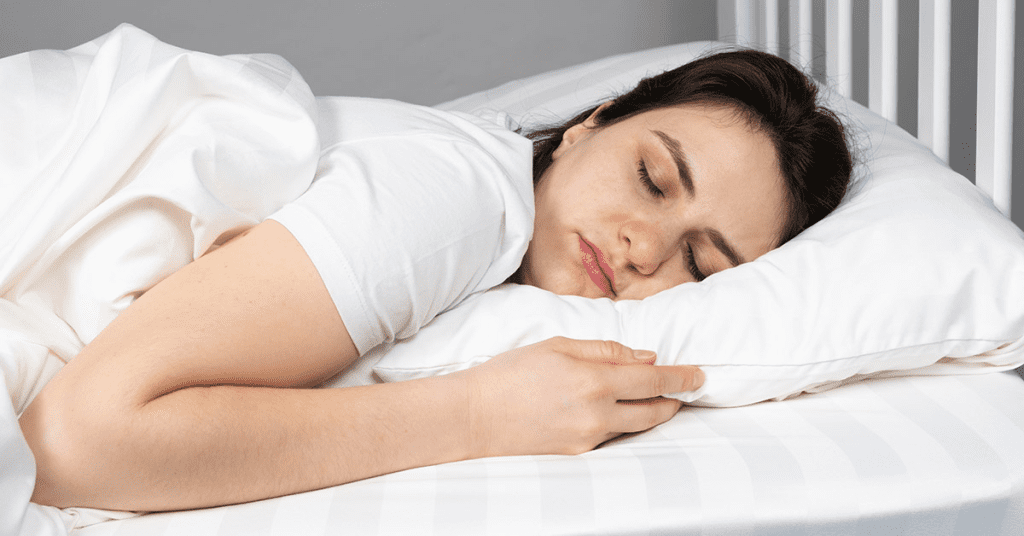Have you ever settled into bed at night, only to be distracted by the sound of your own heartbeat? It may feel like a rhythmic thumping in your ear, almost as if your heart is playing a drumbeat against your pillow. While this experience is common for many people, it can sometimes be unsettling. Is it normal, or could it indicate an underlying health issue?
Why Do You Hear Your Heartbeat on Your Pillow?

Hearing your heartbeat while lying down is usually harmless and has a simple explanation. According to Dr. Anthony Youn, a well-known U.S. surgeon, this phenomenon often occurs due to the carotid artery pressing against your pillow.
The carotid artery is a major blood vessel that runs along both sides of your neck, supplying blood to your brain and head. When you lie down, especially on your side, this artery can press closer to your ear canal, making the sound of your heartbeat more pronounced.
Additionally, your environment plays a role. During the day, external noises mask the subtle sounds of your body. At night, when the world is quiet, your heartbeat may become more noticeable, similar to how you hear the ticking of a clock in a silent room.
The Role of Pulsatile Tinnitus: When Heartbeats Become Noisy
If you consistently hear a pulsing or rhythmic sound in your ear, it may be due to pulsatile tinnitus—a condition that causes a heartbeat-like ringing or thumping in the ears.
Unlike regular tinnitus, which presents as a constant ringing or buzzing, pulsatile tinnitus is synchronized with your heartbeat. According to Tinnitus UK, this condition is often linked to changes in blood flow near the ear or increased awareness of that blood flow.
While pulsatile tinnitus is usually harmless, persistent cases could indicate an underlying medical condition. This is why it’s important to understand what’s causing it.
Common Causes of Pulsatile Tinnitus
Pulsatile tinnitus can be caused by several factors, ranging from benign circulatory changes to more serious health concerns. Here are some common reasons why you may hear your heartbeat in your ear:
1. High Blood Pressure
If your blood pressure is elevated, your arteries experience increased force, which can create turbulent blood flow. This can make your heartbeat more audible, especially when lying down.
2. Atherosclerosis (Narrowed Arteries)
Plaque buildup in the arteries can cause narrowing and hardening, leading to disruptions in normal blood flow. This turbulence can amplify the sound of your heartbeat in your ears.
3. Anemia or Hyperthyroidism
Both conditions can increase blood flow and heart rate, leading to more pronounced pulsatile sounds in the ears.
4. Ear Abnormalities
If you have a perforated eardrum or naturally thin bone structures in the ear, external sounds—including blood flow—may become more audible.
5. Blood Vessel Disorders
In rare cases, vascular malformations, aneurysms, or tumors near the head and neck can put pressure on nearby blood vessels, intensifying the sound of blood flow.
When to Be Concerned: Signs You Should See a Doctor

While hearing your heartbeat in your ear is often harmless, there are certain red flags that warrant medical evaluation. You should consult a doctor if:
- The sound persists and disrupts your sleep.
- You hear the noise even when sitting or standing upright.
- The sound is only in one ear, rather than both.
- You experience headaches, dizziness, or vision changes along with the heartbeat sound.
In some cases, pulsatile tinnitus can be an early sign of carotid artery disease, aneurysms, or arteriovenous malformations—conditions that require medical attention. Early detection is key, so don’t ignore persistent symptoms.
How Doctors Diagnose Pulsatile Tinnitus
If you visit a doctor for pulsatile tinnitus, they will likely conduct a thorough medical history and physical examination.
What to Expect During Your Visit:
- A doctor may listen to your neck with a stethoscope to detect abnormal blood flow.
- You may undergo blood pressure monitoring to rule out hypertension.
- Imaging tests like CT scans, MRIs, or ultrasounds may be used to check for vascular abnormalities.
- Blood tests may be ordered to detect anemia, thyroid disorders, or other metabolic conditions.
Once the cause is identified, treatment can be tailored to address the underlying issue.
Treatment Options for Hearing Your Heartbeat in Your Ear

The best treatment depends on what’s causing the issue. Here are common approaches based on different diagnoses:
1. Managing Blood Pressure
- Reduce sodium intake to prevent hypertension.
- Exercise regularly to improve circulation.
- Take prescribed medications if necessary.
2. Treating Underlying Conditions
- If anemia or thyroid disorders are the cause, supplements or medications may help regulate blood flow.
- For arterial plaque buildup, lifestyle changes and cholesterol-lowering drugs may be recommended.
3. Surgical or Medical Interventions
- If a blood vessel abnormality or tumor is found, surgical correction may be needed.
4. Sound Therapy and Relaxation Techniques
- White noise machines or fans can mask the sound of your heartbeat at night.
- Meditation and breathing exercises help reduce sensitivity to internal noises.
Tips for Coping at Night: How to Sleep Better

If your heartbeat in your ear is keeping you up at night, here are a few simple tricks to help you sleep more peacefully:
- Change your sleeping position – Try sleeping on your back or opposite side to reduce pressure on the carotid artery.
- Use background noise – A fan, air purifier, or white noise machine can help drown out internal sounds.
- Practice relaxation techniques – Deep breathing or meditation before bed can calm your nervous system.
- Avoid caffeine and alcohol before bed – These can increase heart rate and blood flow, making the sound worse.
Final Thoughts: Should You Worry About Hearing Your Heartbeat in Your Ear?
For most people, hearing their heartbeat while lying on a pillow is a normal physiological phenomenon. It’s simply the sound of blood flowing through arteries near your ear, amplified by the quiet environment.
However, if the sound becomes persistent, loud, or is accompanied by other symptoms, it’s wise to seek medical advice. Pulsatile tinnitus can sometimes indicate underlying health conditions, so ruling out serious causes is always a smart move.
Ultimately, understanding your body’s rhythms—and knowing when to seek help—can keep you informed and at ease. So the next time you hear that familiar thump in your ear, you’ll know exactly what’s happening and how to manage it. Sweet dreams!


